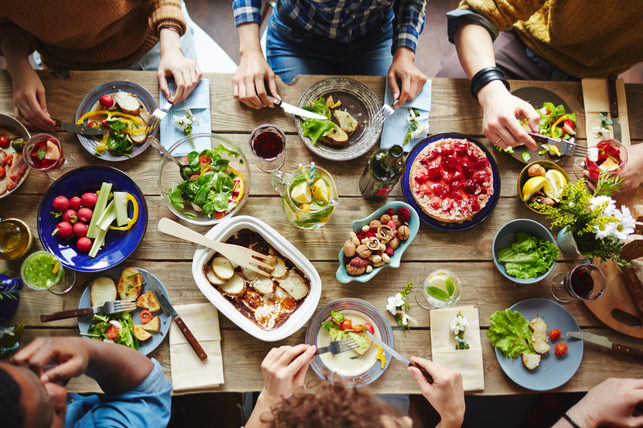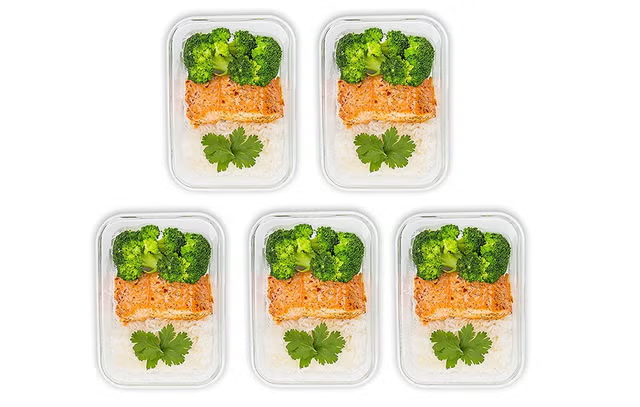
The Ultimate Guide to Meal Planning: A Blueprint for Health, Wealth, and a Simplified Life
In the constant hum of modern life, the daily question, “What’s for dinner?” can feel less like a simple query and more like a significant source of stress. This recurring decision point contributes to a phenomenon known as decision fatigue, draining our mental energy and often leading to last-minute, unhealthy, and expensive choices. Enter meal planning: a strategic, mindful approach to food that transcends simple recipe selection. It’s not just a trend for fitness enthusiasts or budgeting experts; it’s a foundational practice for anyone seeking to improve their overall well-being. By dedicating a small amount of time to plan your meals, you create a powerful ripple effect that touches every aspect of your life, from your physical health and financial stability to your mental clarity and environmental footprint. This comprehensive guide will explore the profound benefits of meal planning, provide a step-by-step blueprint for getting started, and reveal how this simple habit can become a cornerstone of a more intentional, organized, and fulfilling lifestyle.
The Foundational Benefits: More Than Just Food
At its core, meal planning is a system of deciding what you will eat for a set period—be it a few days or a full week—and then shopping for and preparing the components. However, its true power lies in the secondary benefits that extend far beyond the kitchen, impacting your finances, health, and even your contribution to a healthier planet.
Financial Wellness and Budgeting
One of the most immediate and tangible benefits of meal planning is its positive impact on your Personal Finance. Without a plan, grocery store visits often become a series of impulse buys, and the temptation of takeout or restaurant meals can quickly derail a budget. Strategic meal planning transforms your approach. By creating a detailed list based on specific recipes, you buy only what you need, drastically reducing superfluous spending. This disciplined approach is a cornerstone of solid Financial Planning and provides excellent Budget Tips in practice. For instance, a family of four might spend over $250 a week on unplanned groceries and two takeout meals. With a meal plan, that same family could potentially reduce their food spending by 20-30%, freeing up hundreds of dollars a month. This extra capital can be redirected toward savings, investments, or paying down debt, turning a simple kitchen habit into a powerful wealth-building tool. Staying informed on Investment News feels more relevant when you’re actively creating disposable income through smart lifestyle choices.
Health, Nutrition, and Fitness Goals
Meal planning puts you in complete control of your nutritional intake, making it an indispensable tool for anyone focused on Health & Wellness. It allows you to consciously incorporate a variety of nutrients, manage portion sizes, and cater to specific dietary needs, whether you’re managing an allergy, following a medical recommendation, or pursuing specific Fitness Tips like building muscle or training for an event. The latest Nutrition News consistently emphasizes the importance of whole foods and balanced diets, which is far easier to achieve with a plan. This proactive approach to eating supports stable energy levels, better digestion, and improved Sleep Health. Ultimately, it’s a key component of Holistic Health, recognizing that what we eat directly influences our physical vitality and mental acuity.
Environmental Impact and Sustainable Living
The global issue of food waste has a significant environmental cost, and households are major contributors. Meal planning is a powerful act of Sustainable Living. By purchasing ingredients with a specific purpose, you dramatically reduce the likelihood of produce wilting in the crisper or leftovers being forgotten in the back of the fridge. This commitment to using what you buy is a practical step toward a Zero Waste lifestyle. Furthermore, planning allows for more conscious consumption, such as incorporating seasonal produce from local farms or integrating harvests from your own Urban Gardening efforts. This mindful approach aligns perfectly with the principles of Eco-Friendly Living and Green Living, demonstrating that small changes in our daily routines can have a substantial positive impact on the planet.
Crafting Your Personal Meal Plan: A Step-by-Step Guide
Getting started with meal planning doesn’t have to be overwhelming. By breaking it down into manageable steps, you can create a sustainable system that works for your unique lifestyle. This process is a form of Personal Development, building skills in organization and foresight.

Step 1: The Audit and Goal Setting
Before you can plan for the future, you need to know what you have. Begin by conducting a full audit of your pantry, refrigerator, and freezer. This act of Home Organization and Decluttering helps you take stock of your inventory and prevents you from buying duplicates. Once you know what you have, set clear, simple goals. Are you aiming to reduce your grocery bill, try one new Healthy Recipe per week, or simply avoid the 5 PM dinner scramble? Defining your “why” will provide the motivation to stick with the process. This initial phase sets the stage for success and aligns with a Minimalism-inspired ethos of using what you already own.
Step 2: The Planning Phase – Tools and Techniques
This is where you map out your meals. You can use a simple notebook, a whiteboard in your kitchen, a spreadsheet, or a dedicated meal planning app. Leveraging Technology for Home can streamline this process; many apps offer recipe suggestions, generate shopping lists, and even integrate with grocery delivery services. A great technique for beginners is to assign themes to each night (e.g., Meatless Monday, Taco Tuesday, Pasta Wednesday). This provides structure while still allowing for creativity, reducing the mental load of decision-making. Involving the whole family in this planning can be a great aspect of Family Life, giving everyone a say and increasing the chances they’ll enjoy the meals.
Step 3: The Shopping and Prep Phase
With your plan in hand, create a master grocery list organized by store section (e.g., produce, dairy, meats) to make your shopping trip efficient. This is one of the most effective Productivity Tips for saving time. After shopping comes the “meal prep” phase, which is a game-changer for maintaining Work-Life Balance, especially for those in Remote Work who need to structure their days. You don’t have to cook every meal in advance. Even an hour of prep on a Sunday can make a huge difference. This could involve:
- Washing and chopping vegetables.
- Cooking a large batch of grains like quinoa or rice.
- Marinating proteins.
- Making a big salad dressing for the week.
- Portioning snacks into grab-and-go containers.
This upfront investment of time pays dividends during a busy week, making healthy, home-cooked meals as convenient as takeout.
The Holistic Impact on Your Lifestyle
The discipline of meal planning creates a positive feedback loop that enhances many other areas of your life, fostering a sense of control, calm, and intentionality that goes far beyond the dinner table.
Mental Clarity and Reduced Decision Fatigue
Every day, we are faced with thousands of decisions. By automating the recurring “what to eat” question, you conserve precious mental energy. This reduction in cognitive load is a powerful form of Stress Management and directly benefits your Mental Health. The process of planning can itself be a form of Mindfulness, a quiet moment to focus and organize your week. The mental space you free up can be reallocated to more important areas, whether it’s focusing on Career Advice for professional growth, engaging in Hobbies like reading or painting, or simply being more present in your Relationships.
Strengthening Family and Community Bonds
Meal planning can transform mealtime from a chaotic chore into a cherished ritual. When you involve your partner or children in the planning and prep process, you’re teaching valuable life skills and fostering a sense of teamwork. These are practical Parenting Tips that build responsibility and a healthy relationship with food. The consistency of planned family dinners strengthens Family Life. Moreover, being organized with your food allows you to more easily extend hospitality, whether it’s doubling a recipe to share with a neighbor, planning for a potluck, or contributing to Community Living events. This fosters a sense of connection and supports your social well-being, which is crucial for Aging Well.

A Gateway to Other Positive Habits
Mastering meal planning often inspires a cascade of other positive changes. The organizational skills you develop can motivate you to tackle other areas of your home, leading to Home Improvement projects or new Home Decor ideas. The focus on health might inspire you to explore Alternative Medicine, start a meditation practice, or subscribe to Yoga News for at-home routines. The financial savings might spark an interest in more sophisticated Financial Planning. This single habit demonstrates the power of small, consistent actions, serving as a catalyst for broader Self-Improvement and a more curated, intentional life.
Common Pitfalls and Best Practices for Success
While the benefits are clear, sticking to a meal plan requires navigating a few common challenges. Acknowledging these pitfalls and adopting flexible strategies is key to long-term success.
The Rigidity Trap: Building in Flexibility
A common mistake is creating a plan that is too rigid and ambitious. Life is unpredictable. A friend might suggest a spontaneous dinner out, or you may simply not be in the mood for what you planned.
Best Practice: Plan meals for only 5-6 nights a week. This builds in a “flex night” for leftovers, takeout, or a spontaneous social outing. This approach prevents burnout and makes the plan feel sustainable rather than restrictive. It respects the need for spontaneity, which is vital for a healthy Work-Life Balance.
Combating Boredom and Repetition
Eating the same rotation of meals can lead to “flavor fatigue,” making it tempting to abandon the plan altogether.
Best Practice: Dedicate one meal slot per week to trying something new. Draw inspiration from different cultures by following Travel News, explore a new cookbook, or try a recipe from a Food & Cooking blog. This keeps your palate excited and continuously expands your culinary repertoire.
Leveraging Technology Wisely
Apps and Smart Home devices can be incredibly helpful, but they can also add complexity or cost.
Best Practice: Evaluate tools based on your actual needs. A simple notes app might be all you require. If you do opt for a subscription service, take advantage of free trials to see if it genuinely simplifies your life. Always be mindful of data privacy, a growing concern in the realm of Home Security and personal technology.
Conclusion: Your Foundation for an Intentional Life
Meal planning is far more than a logistical solution to dinner. It is a profound act of self-care and a powerful tool for personal transformation. By taking control of this fundamental aspect of your daily life, you unlock a wealth of benefits that ripple outward, enhancing your financial security, physical health, mental peace, and environmental consciousness. It is a practice in mindfulness, a lesson in productivity, and a commitment to a more sustainable and organized existence. Whether you are a busy professional, a parent juggling multiple schedules, or anyone seeking to live more intentionally, embracing meal planning is one of the most impactful steps you can take. It lays the foundation for a life that is less reactive and more deliberately designed, one delicious, well-planned meal at a time.
You may also like

Stop PDF-ing Your Cultural Calendars

Your Smart Home Shouldn’t Look Like a Best Buy

Archives
- February 2026
- January 2026
- December 2025
- November 2025
- October 2025
- September 2025
- August 2025
- July 2025
- June 2025
- May 2025
- April 2025
- March 2025
- February 2025
- January 2024
- October 2023
- September 2023
- August 2023
- July 2023
- June 2023
- May 2023
- April 2023
- March 2023
- February 2023
- January 2023
- December 2022
- November 2022
- October 2022
- September 2022
- August 2022
- June 2022
- May 2022
- April 2022
- March 2022
- January 2022
- December 2021
- November 2021
- October 2021
- August 2021
- November 2020
- July 2020
- May 2020
- April 2020
- March 2020
- August 2018
- July 2018
- June 2018
- April 2018
- March 2018
Categories
- Aftercare Procedures
- Age Groups
- AI/ML
- Alternative Medicine
- Ambient Computing
- Animal Health
- Animal Husbandry
- Animals
- Anti-Aging
- Architectural Design
- Art And Technology
- Auditory Science
- Augmented Reality
- Automation
- Babies
- Baby
- Beauty & Skincare
- Beauty Industry
- Biohacking
- Biomechanics
- Book Reviews
- Breastfeeding
- Budgeting
- Budgeting Strategies
- Business
- Cardiovascular Health
- Career Advice
- Career Development
- Career Growth
- Cats
- Chess
- Chronobeauty
- Circular Economy
- Civic Technology
- Cleaning Tips
- Cloud Computing
- Cognitive Health
- Cognitive Performance
- Cognitive Science
- Community
- Community Building
- Community Engagement
- Community Living
- Computer Vision
- Consumer Guides
- Consumer Trends
- Container Gardening
- Content Analysis
- Content Non-Technical
- Content Strategy
- Cooking Techniques
- Cosmetic Chemistry
- Cultural Events
- Cycling
- Data Analysis
- Data Engineering
- Data Governance
- Data Science
- Database
- Design Psychology
- Design Trends
- Developer Productivity
- Diet
- Diet
- Diet And Nutrition
- Digital Identity
- Digital Media
- Digital Wellbeing
- DIY
- DIY Projects
- Dogs
- Engineering Culture
- Entertainment News
- Environmental Impact
- Environmental Science
- Equity Compensation
- Ethical AI
- Exercise
- Exercise Science
- Exercise Technique
- Exotic Pets
- Fall Gardening
- Family
- Family Health
- Family Life
- Fashion Business
- Fashion Industry
- Fashion News
- Fashion Tech
- Financial Analysis
- Financial Optimization
- Financial Planning
- Flooring Maintenance
- Food
- Food Psychology
- Food Safety
- Food Science
- Food Tech
- Functional Fitness
- Functional Training
- Future Of Work
- Garden Care
- Garden Maintenance
- Gardening Tips
- Geospatial Data
- Gig Economy
- Greece
- Greek
- Greek Food
- Green Technology
- Gymnastics
- Hardware Engineering
- Health
- Health And Wellness
- Health Informatics
- Health Science
- Health Tech
- Health Technology
- Healthcare
- Healthcare Management
- Healthy Eating
- Healthy Recipes
- Holistic Health
- Holistic Wellness
- Home & Living
- Home Decor
- Home Financing
- Home Health
- Home Improvement
- Home Maintenance
- Home Organization
- Home Styling
- Horticulture
- Household Chemistry
- Identity Management
- Indoor Gardening
- Industrial Design
- Industry Analysis
- Infant Nutrition
- Infrastructure Management
- Ingredient Deep Dive
- Integrative Health
- Integrative Medicine
- Interior Design
- Internet of Things
- Internet of Things (IoT)
- Invalid Request
- Investment Strategies
- Investment Strategy
- IoT
- Kids
- Leadership Development
- Learning Strategies
- Lifestyle
- Lifestyle Brands
- Lifestyle News
- Lifestyle Optimization
- Literary Criticism
- Literature
- Logistics Management
- Machine Learning
- Material Science
- Materials Science
- Meal Planning
- Media Analysis
- Meditation
- Mental Health
- Mental Performance
- Mental Wellness
- Miami
- Miami Food
- Mind And Body
- Minimalism
- Mobile Development
- Neuroscience
- No Applicable Categories
- Nursing
- Nutrition
- Nutrition News
- Open Source
- Operating Systems
- Operational Resilience
- Opinion
- Organization Tips
- Outdoor Living
- Over 40
- Over 50
- Over 60
- Parenting
- Parenting
- Parenting Strategies
- Performance
- Performance Optimization
- Personal Development
- Personal Finance
- Personal Growth
- Personal Productivity
- Pet Care
- Pet Safety
- Philosophy
- Plant Care
- Politics
- Product Formulation
- Productivity
- Productivity Engineering
- Protein
- Psychology
- Psychology of Space
- Quantified Self
- Reading Culture
- Real Estate Investment
- Recipes
- Regulatory Compliance
- Remote Work
- Renovation Planning
- Resource Management
- Respiratory Health
- Responsible Pet Ownership
- Retail Strategy
- Retail Technology
- Robotics
- Science
- Seafood
- Seasonal Gardening
- Security
- Sedentary Health
- Self-Care
- Skincare Science
- Skincare Trends
- Sleep
- Sleep Health
- Smart Home
- Smoothies
- Social Impact
- Soft Skills
- Soil Health
- Spatial Computing
- Spatial Design
- Stress Management
- Supplements
- Sustainability
- Sustainability Science
- Sustainable Engineering
- Sustainable Fashion
- Systems Engineering
- Tax Optimization
- Tax Strategy
- Tech Investment
- Technical Writing
- Testing
- Travel
- Travel News
- Travel Safety
- Travel Tips
- Trend Analysis
- Tropical Plants
- Uncategorized
- Urban Gardening
- Urban Planning
- User Experience
- Veggie
- Vietnam
- Virtual Events
- Volunteering
- Wealth Management
- Wearable Technology
- Web Development
- Wellness
- Wellness Technology
- Winter Gardening
- Work-Life Balance
- Workplace Culture
- Workspace Setup
- World
- Writing
- Writing Skills
- Year In Review
- Yoga
- Yoga News
- Zero Waste

Leave a Reply